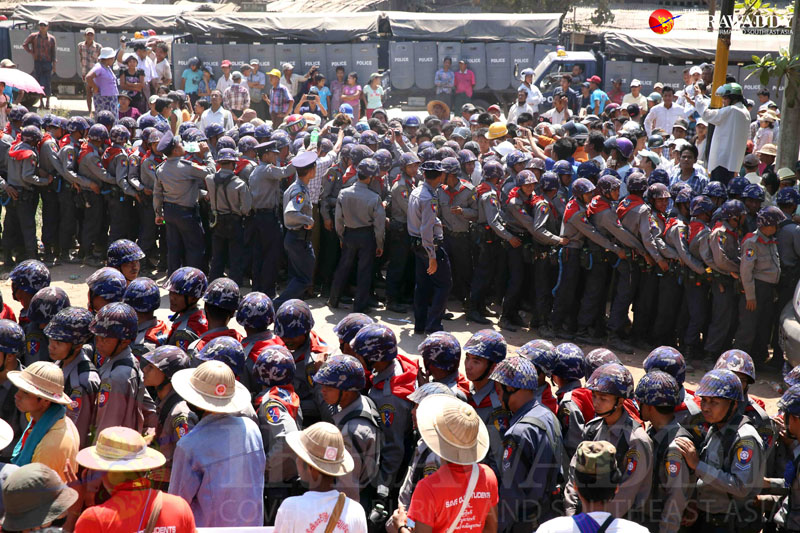The Asian Human Rights Commission has documented that an increasing number of peaceful protesters are being arrested and jailed under the Peaceful Assembly and Peaceful Procession Act. Citing the maintenance of peace and tranquility in the country, and ensuring the upcoming 2015 election remain peaceful, authorities, especially Administrative Officers, have filed cases against numerous peaceful protesters under this Act.
The Peaceful Assembly and Peaceful Procession Act was enacted in December 2011 and the regulations relating to the law passed in July 2012. In a statement issued on 24 September 2013, the AHRC had noted:
“… contrary to its title and as proven in practices over the last two years, far from enabling the exercise of rights to assemble and demonstrate the law does precisely the opposite by requiring people to request permission for events from local police stations, who can arbitrarily approve or decline such assemblies as they see fit. The section is quickly becoming notorious as more and more people who are declined permits to rally-without rhyme or reason-and then do so nonetheless are prosecuted.”
In June 2014 the law was amended; however, no regulations to the amended law have been passed to date. This has led to another layer of difficulty for peaceful protesters seeking to exercise their constitutional rights, and given the authorities greater possibilities for misuse.

Tension mounts in Letpada, Bago Division, as a deadline looms for some 170 student demonstrators holding a sit-in after their march was thwarted by police on March 3, 2015. (Photo: JPaing / Photo courtesy: The Irrawaddy)
The AHRC has noted an alarming increase in the number of cases where peaceful protesters have had charges brought against them under Article 18 of the Peaceful Assembly and Peaceful Procession Act. Such cases include the following:
- Ko Thein Aung Myint and four other activists have been sentenced to 6 months imprisonment, which is the maximum punishment under Article 18 of this law, because they protested against an increase in electricity bills in Mandalay.
- U Soe Wai, a single protester, has been charged for trying to wrest back the farmlands along the Ngapali Beach, Thandwe Township, Rakhine State, which had been grabbed by the Military. Mr. Wai has had to serve a 3 months prison term.
- U Myint Aye, Chief Court Advocate, and Ko Myo Thu Htut, from Pyi Township, Bago Region, were sentenced to 4 months imprisonment with hard labour on 2 April 2015, the first day of their trial. They had protested re-construction of the Student Union Building.
- Two leaders of the second year anniversary of Letpadaung crackdown protest, Daw Naw Own Hla and U Than Swe were put into jail for four months on 2 April 2015 in Bahan Township. The authority charged them for allegedly organising peaceful rallies.
- Ko Wai Lu was arrested for providing support to the Michaungkan protesters over a land dispute involving the Military in Yangon. Under section 505(b) of the Penal Code, a law commonly used to detain political activists, and Article 18 of the Peaceful Assembly and Peaceful Procession Act, he was sentenced to a one-year imprisonment.
- Numerous activists seeking to uphold farmer rights and labour rights, and many farmers, who protested for the return of their confiscated lands, have subjected to a crackdown by the authorities and are facing trial in respective township courts. Cases have been filed against them under Article 18 of the Peaceful Assembly and Peaceful Procession Act and also under sections of the Penal Code, including section 505(b).
In addition to the above, students who protested for the amendment of the National Education Law faced violent police action last month. Some of them have had cases filed against them under sections 143, 145, 147, 332 and 505(b) of the Penal Code. They have also been prosecuted under this law in every township that they passed through, as they marched from Mandalay to Yangon.
Although the Constitution of the Union of Myanmar allows citizens to enjoy peaceful procession, these rights have being neglected and abused by the authorities.
Section 354 of the Constitution states the following:
“Every citizen shall be at liberty in the exercise of the following rights, if not contrary
to the laws, enacted for Union security, prevalence of law and order, community peace and tranquility or public order and morality:
(a) to express and publish freely their convictions and opinions;
(b) to assemble peacefully without arms and holding procession.”
On one hand, the government of Myanmar claims progress in political reform by showcasing the number of political prisoners released, amongst other measures. And, on the other hand, it continues to prosecute peaceful protestors following violent police action.
A truly democratic space would allow people to act and speak freely about subjects government officials may like or dislike. However, in Myanmar, if the government does not like something a common citizen speaks about, its response is to detain and prosecute.
Democratic life is thus still a fantasy in Myanmar. The judicial system in Myanmar is still under the control of administrative and executive authorities; a gaping hole where the rule of law should be makes matters worse. The protesters were doing no more than exercising their democratic rights, and they are innocent of any offence.
The AHRC condemns the continued persecution of peaceful protesters, and calls for the release of the arrested people immediately. The AHRC also calls for the passing of regulations in terms of the Peaceful Assembly and Peaceful Procession Act so citizens can abide by the procedures in exercising their constitutional rights.